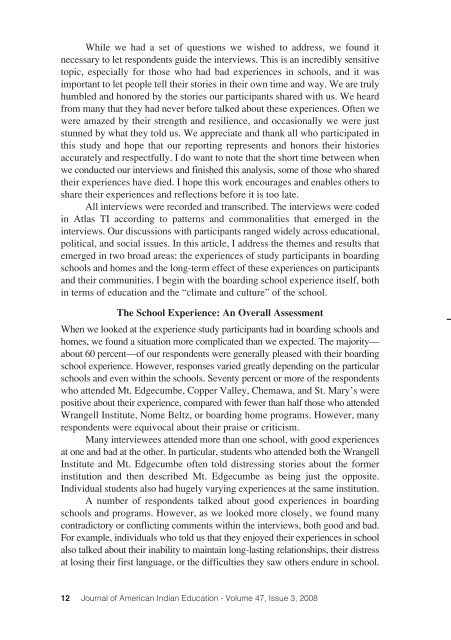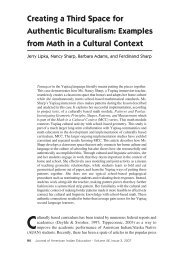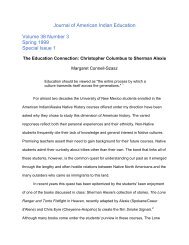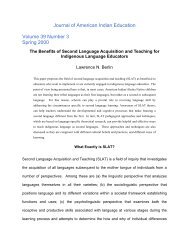Alaska Natives in Past Boarding Schools - Journal of American ...
Alaska Natives in Past Boarding Schools - Journal of American ...
Alaska Natives in Past Boarding Schools - Journal of American ...
Create successful ePaper yourself
Turn your PDF publications into a flip-book with our unique Google optimized e-Paper software.
While we had a set <strong>of</strong> questions we wished to address, we found itnecessary to let respondents guide the <strong>in</strong>terviews. This is an <strong>in</strong>credibly sensitivetopic, especially for those who had bad experiences <strong>in</strong> schools, and it wasimportant to let people tell their stories <strong>in</strong> their own time and way. We are trulyhumbled and honored by the stories our participants shared with us. We heardfrom many that they had never before talked about these experiences. Often wewere amazed by their strength and resilience, and occasionally we were juststunned by what they told us. We appreciate and thank all who participated <strong>in</strong>this study and hope that our report<strong>in</strong>g represents and honors their historiesaccurately and respectfully. I do want to note that the short time between whenwe conducted our <strong>in</strong>terviews and f<strong>in</strong>ished this analysis, some <strong>of</strong> those who sharedtheir experiences have died. I hope this work encourages and enables others toshare their experiences and reflections before it is too late.All <strong>in</strong>terviews were recorded and transcribed. The <strong>in</strong>terviews were coded<strong>in</strong> Atlas TI accord<strong>in</strong>g to patterns and commonalities that emerged <strong>in</strong> the<strong>in</strong>terviews. Our discussions with participants ranged widely across educational,political, and social issues. In this article, I address the themes and results thatemerged <strong>in</strong> two broad areas: the experiences <strong>of</strong> study participants <strong>in</strong> board<strong>in</strong>gschools and homes and the long-term effect <strong>of</strong> these experiences on participantsand their communities. I beg<strong>in</strong> with the board<strong>in</strong>g school experience itself, both<strong>in</strong> terms <strong>of</strong> education and the “climate and culture” <strong>of</strong> the school.The School Experience: An Overall AssessmentWhen we looked at the experience study participants had <strong>in</strong> board<strong>in</strong>g schools andhomes, we found a situation more complicated than we expected. The majority—about 60 percent—<strong>of</strong> our respondents were generally pleased with their board<strong>in</strong>gschool experience. However, responses varied greatly depend<strong>in</strong>g on the particularschools and even with<strong>in</strong> the schools. Seventy percent or more <strong>of</strong> the respondentswho attended Mt. Edgecumbe, Copper Valley, Chemawa, and St. Mary’s werepositive about their experience, compared with fewer than half those who attendedWrangell Institute, Nome Beltz, or board<strong>in</strong>g home programs. However, manyrespondents were equivocal about their praise or criticism.Many <strong>in</strong>terviewees attended more than one school, with good experiencesat one and bad at the other. In particular, students who attended both the WrangellInstitute and Mt. Edgecumbe <strong>of</strong>ten told distress<strong>in</strong>g stories about the former<strong>in</strong>stitution and then described Mt. Edgecumbe as be<strong>in</strong>g just the opposite.Individual students also had hugely vary<strong>in</strong>g experiences at the same <strong>in</strong>stitution.A number <strong>of</strong> respondents talked about good experiences <strong>in</strong> board<strong>in</strong>gschools and programs. However, as we looked more closely, we found manycontradictory or conflict<strong>in</strong>g comments with<strong>in</strong> the <strong>in</strong>terviews, both good and bad.For example, <strong>in</strong>dividuals who told us that they enjoyed their experiences <strong>in</strong> schoolalso talked about their <strong>in</strong>ability to ma<strong>in</strong>ta<strong>in</strong> long-last<strong>in</strong>g relationships, their distressat los<strong>in</strong>g their first language, or the difficulties they saw others endure <strong>in</strong> school.12 <strong>Journal</strong> <strong>of</strong> <strong>American</strong> Indian Education - Volume 47, Issue 3, 2008





